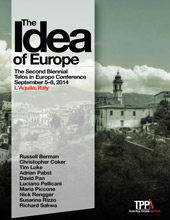 As the first wars to be waged on European soil since the Second World War, the Balkan crises constituted a defining moment for post-Cold War Europe, and particularly for the newly united nation at its center: Germany. The political and humanitarian crises that ravaged the former Yugoslavia between 1991 and 1999 had a significant impact on migration patterns to Germany; the BRD took in 48% of all refugees from the war-torn region, vastly more than any other European country. This was not just a test of whether or not Germany would welcome migrants, a large portion of whom were Muslims. It was also a test of how Germany, in light of its own genocidal past, would react to the Serbian policy of “ethnic cleansing” and how it would treat its position in NATO, a membership that would cause the first mobilization of German troops since World War II. When we consider these various factors and dilemmas, Germany’s role in the conflict is certainly fraught, especially when we recall that the German government under Helmut Kohl and Hans-Dietrich Genscher exacerbated the Yugoslav crisis through its hasty recognition of Slovenia and then of its World War II ally Croatia as independent states. These decisions undermined the legitimacy of the Yugoslavian multiethnic state and set off a chain reaction that led first to the evacuation of Serbs from the new Croatian nation and eventually to the ethnic cleansing of Bosnian Muslims by Serbs.[1]
As the first wars to be waged on European soil since the Second World War, the Balkan crises constituted a defining moment for post-Cold War Europe, and particularly for the newly united nation at its center: Germany. The political and humanitarian crises that ravaged the former Yugoslavia between 1991 and 1999 had a significant impact on migration patterns to Germany; the BRD took in 48% of all refugees from the war-torn region, vastly more than any other European country. This was not just a test of whether or not Germany would welcome migrants, a large portion of whom were Muslims. It was also a test of how Germany, in light of its own genocidal past, would react to the Serbian policy of “ethnic cleansing” and how it would treat its position in NATO, a membership that would cause the first mobilization of German troops since World War II. When we consider these various factors and dilemmas, Germany’s role in the conflict is certainly fraught, especially when we recall that the German government under Helmut Kohl and Hans-Dietrich Genscher exacerbated the Yugoslav crisis through its hasty recognition of Slovenia and then of its World War II ally Croatia as independent states. These decisions undermined the legitimacy of the Yugoslavian multiethnic state and set off a chain reaction that led first to the evacuation of Serbs from the new Croatian nation and eventually to the ethnic cleansing of Bosnian Muslims by Serbs.[1]
|
At the 2014 Telos in Europe Conference in L’Aquila, Italy, sociologist Dan Krier talked about his experiences at the conference as well as what distinguished the Telos conference from more discipline-specific academic gatherings. For anyone interested in participating in the upcoming 2015 Telos Conference in New York, abstracts will be accepted through October 20. For complete details and the full call for papers, please visit the Telos-Paul Piccone Institute website. We hope to see you there! Whether you attended or not, you’ll want to see this wonderful collection of photos from the recent Telos in Europe Conference, held in L’Aquila, Italy, in early September. Below is a sample, but you can view the full set over at our Facebook page. And just a reminder, there’s still time to submit your abstract for the upcoming 2015 Telos Conference in New York. For complete details, visit the Telos-Paul Piccone Institute website. The following paper was presented at the recent Telos in Europe conference on “The Idea of Europe,” held in L’Aquila, Italy, on September 5–8, 2014. Earlier this month, the Telos-Paul Piccone Institute hosted its second Telos in Europe conference, focusing on “The Idea of Europe,” in L’Aquila, Italy, and we will be posting a number of papers from the conference in the coming weeks on this blog. In the meantime, we would like to take a moment to share with you the Institute’s mission, activities, and goals. You can help support the ongoing scholarly work of this non-profit organization by making a tax-deductible donation at the Telos-Paul Piccone Institute website. |
||||
|
Telos Press Publishing · PO Box 811 · Candor, NY 13743 · Phone: 212-228-6479 Privacy Policy · Data Protection Copyright © 2025 Telos Press Publishing · All Rights Reserved |
||||


